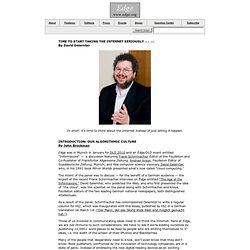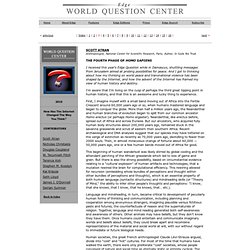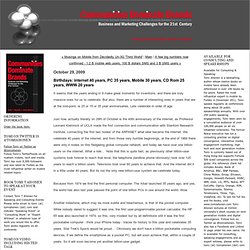

BBC World Service - Special Reports - SuperPower: The Extraordin. Imagining the Internet. Latest Project: The 2014 Hall of Fame interviews, recorded in Hong Kong Hall of Famers share wisdom Imagining the Internet sent a team to the Internet Society's 2014 Internet Hall of Fame induction in Hong Kong to gather interviews with 28 top global Internet leaders. View four hours of interviews plus the Induction Ceremony and a panel discussion and a forum on the open Internet.
The Internet of Things - McKinsey Quarterly - High Tech - Hardwa. In most organizations, information travels along familiar routes. Proprietary information is lodged in databases and analyzed in reports and then rises up the management chain. Information also originates externally—gathered from public sources, harvested from the Internet, or purchased from information suppliers.
But the predictable pathways of information are changing: the physical world itself is becoming a type of information system. In what’s called the Internet of Things, sensors and actuators embedded in physical objects—from roadways to pacemakers—are linked through wired and wireless networks, often using the same Internet Protocol (IP) that connects the Internet. These networks churn out huge volumes of data that flow to computers for analysis. Pill-shaped microcameras already traverse the human digestive tract and send back thousands of images to pinpoint sources of illness. Podcast When virtual-world capabilities meet real-world businesses Exhibit Enlarge.
TIME TO START TAKING THE INTERNET SERIOUSLY By David Gelernter. 1.

No moment in technology history has ever been more exciting or dangerous than now. The Internet is like a new computer running a flashy, exciting demo. We have been entranced by this demo for fifteen years. But now it is time to get to work, and make the Internet do what we want it to. 2. 3. 4. 5. 6. 7. 8. 9. 10. 11. 12. 13. 14. THE WORLD QUESTION CENTER 2010 — Page 3. SCOTT ATRAN Anthropologist, National Center for Scientific Research, Paris; Author, In Gods We Trust I received this year's Edge Question while in Damascus, shuttling messages from Jerusalem aimed at probing possibilities for peace.

And I got to thinking about how my thinking on world peace and transnational violence has been shaped by the Internet, and how the advent of the Internet has framed my view of human history and destiny. I'm aware that I'm living on the cusp of perhaps the third great tipping point in human history, and that this is an awesome and lucky thing to experience.
First, I imagine myself with a small band moving out of Africa into the Fertile Crescent around 60,000 years ago or so, when humans mastered language and began to conquer the globe. More than half a million years ago, the Neanderthal and human branches of evolution began to split from our common ancestor Homo erectus (or perhaps Homo ergaster). Here are two snippets that illustrate this duality: Birthdays: internet 40 years, PC 35. It seems that the years ending in 9 make great moments for inventions, and there are truly massive ones for us to celebrate.

But also, there are a number of interesting ones in years that are at the mid-point, ie 25 or 15 or 35 year anniversaries. Lets celebrate in order of age: Just now, actually literally on 29th of October is the 40th anniversary of the internet, as Professor Leonard Kleinrock of UCLA made the first connection and communication with Stanford Research Institute, connecting the first two 'nodes' of the ARPANET what later became the internet. We celebrate 40 years of the internet, and from those very humble beginnings, at the end of 1969 there were only 4 nodes on this fledgeling global computer network, and today we have over one billion users on the internet. What a ride... Because from 1974 we find the first personal computer. Another milestone, which may be more subtle and treacherous, is that of the pocket computer. Fast forward five years, and we get to 1979.